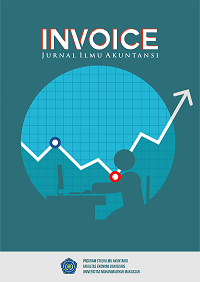Regional Taxes and Retributions as a Source of Fixed Regional Income Every Year
DOI:
https://doi.org/10.26618/inv.v5i1.10536Abstract
One of the main objectives of Regional Taxes and Regional Levies is to determine the level of effectiveness achieved for each type of tax, the effect of local tax revenue on the contribution of each type of regional tax (PAD), and people's welfare. in the city of Bandung. The problems faced by regions in general are exploring sources of regional taxes and regional fees which are one of the PAD components, which have not contributed significantly to regional revenues as a whole. Through the secondary data research method the author tries to answer the above problems in this thesis by examining PAD components which have not made a significant contribution.
References
Official Siti Edition 11, Book 1, 2019, Theory and Case Taxation, Salemba publisher
Prof. Dr. Mardiasmo, MBA, Ak, 2019, 2019 Edition of Taxation, ANDI Yogyakarta publisher.
Law number 28 of 2009 Law (UU) concerning Regional Taxes and Regional Levies enacted on 15 September 2009
Law 34 of 2000 Law (UU) concerning Amendment to the Law of the Republic of Indonesia Number 18 of 1997 concerning Regional Taxes and Regional Retribution which was stipulated on December 20, 2000
Marsuni, N. S., Rohmatunnisa, I., Nirwani, N., Pontoh, G. T., & Mediaty, M. (2022). Analysis Of Accounting Information Systems (SIA) In Preventing Froud. SEIKO: Journal of Management & Business, 5(2), 94-102.
Akhmad, A., & Marsuni, N. S. (2019). Causality Relationship of Poverty, Unemployment Rate, and Economic Growth in South Sulawesi Province. Jurnal Ekonomi Balance, 15(2), 231-241.
Marsuni, N. S. (2019). PENGARUH PRAKTIK ISLAMIC CORPORATE SOCIAL RESPONSIBILTY (I-CSR) TERHADAP KINERJA KEUANGAN PADA BANK UMUM SYARIAH PERIODE 2014-2018.
Marsuni, N. S., & Ahmar, A. A. (2018). ANALYSIS OF INCOME LEVEL OF COCOA FARMERS IN SUPPORTING REGIONAL DEVELOPMENT IN IWOIMENDAA DISTRICT, KOLAKA REGENCY, SOUTHEAST SULAWESI PROVINCE. Jurnal Ekonomi Balance, 14(2), 247-252.
Marsuni, N. S., & Rismawati, R. (2018). INCOME AND COST ANALYSIS OF BUSINESS ACTIVITIES DEVELOPMENT AT THE BUSINESS DEVELOPMENT CENTER (P2B) STATE ISLAMIC UNIVERSITY OF MAKASSAR. Jurnal Ekonomi Balance, 14(1), 129-136.
Marsuni, N. S., & Yusuf, M. (2022). Concept of Financial Management in Islamic Perspective. INVOICE: JURNAL ILMU AKUNTANSI, 4(2), 346-352.
Marsuni, N. S., Said, D., & Indrijawati, A. (2022). Triple Button Line Implementation Through Corporate Social Responsibilty Program at PT. Semen Tonasa. Economos: Jurnal Ekonomi dan Bisnis, 5(2), 107-113.
Marsuni, N. S., Rasulong, I., & Adzim, F. (2022). Factors Affecting the Implementation of Good Government Governance (GGG) and Its Implications for Performance Accountability. Jurnal Ekonomi Balance, 18(1), 29-36.
Downloads
Published
Issue
Section
License
Authors who publish with Invoice: Jurnal Ilmu Akuntansi agree to the following terms:
Copyright Ownership
The copyright of all articles published in this journal remains with the author(s). However, the authors grant Invoice: Jurnal Ilmu Akuntansi the right of first publication with the work simultaneously licensed under a Creative Commons Attribution 4.0 International License (CC BY 4.0). This license allows others to share, copy, redistribute, adapt, and build upon the work for any purpose, even commercially, as long as proper credit is given to the original author(s) and the source.Licensing and Access
Invoice: Jurnal Ilmu Akuntansi provides immediate open access to its content on the principle that making research freely available to the public supports a greater global exchange of knowledge. All published materials are available freely without subscription or payment and can be accessed, downloaded, and reused by any user provided that appropriate attribution is given.Permission for Reuse
For uses not covered by the CC BY 4.0 license, such as commercial reprints, translations, or any form of adaptation without clear attribution, users must obtain written permission from the editorial team. Requests for such permissions can be directed to the editorial office at: [insert journal email here].Plagiarism and Originality
Authors are responsible for the originality of their submissions. All articles are screened for plagiarism using appropriate tools before acceptance. Manuscripts found to contain unoriginal content or infringing materials will be rejected or retracted as per journal policy.

